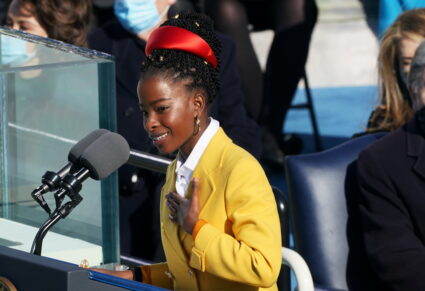
Each year Super Bowl ads offer a snapshot of the American mood — as well as which industries are flush…

FORT LAUDERDALE, Fla. (AP) — A poem written for President Joe Biden's inauguration has been placed on a restricted list at a South Florida elementary school after one parent's complaint.
In a Facebook post on Tuesday, poet Amanda Gorman vowed to fight back. Her poem, "The Hill We Climb" was challenged by the parent of two students at Bob Graham Education Center in Miami Lakes, along with several books.
"I'm gutted," she wrote. "Robbing children of the chance to find their voices in literature is a violation of their right to free thought and free speech."
Gorman, who at 17 became the country's National Youth Poet Laureate, said she wrote the poem "The Hill We Climb," so "all young people could see themselves in a historical moment," and that she's received countless letters and videos from children who were inspired to write their own poems.
She became an international sensation at Biden's inauguration, where she was the youngest poet to read at the ceremony since Robert Frost was invited to John F. Kennedy's in 1961.
In "The Hill We Climb," Gorman references everything from Biblical scripture to "Hamilton," and at times echoes the oratory of Kennedy and the Rev. Martin Luther King Jr. With urgency and assertion she begins by asking, "Where can we find light/In this never-ending shade?" and used her own poetry and life story as an answer.
READ MORE: Amanda Gorman's poetic answer to pandemic grief: 'Do not ignore the pain'
She said she planned to share a message of hope for Biden's inauguration without ignoring "the evidence of discord and division." She had completed a little more than half of the poem before Jan. 6 and the siege of the U.S. Capitol by supporters of then-President Donald Trump.
The poem and books are still available in the media center for middle school-aged children, Ana Rhodes, a spokesperson for the Miami-Dade school district, said in a statement.
While book bans are not new, they are happening much more frequently, especially in Florida — where Republican Gov. Ron DeSantis has championed policies that allow the censorship of books some have deemed inappropriate for children in schools, causing national uproar.
DeSantis, who entered the 2024 presidential race Wednesday, has leaned heavily into cultural divides on race, sexual orientation and gender as he gains support from conservative voters who decide Republican primary elections.
White House press secretary Karine Jean-Pierre condemned the decision to ban Gorman's poem, saying Biden and his administration stands with her.
"The President was proud to have Ms. Gorman, the youngest inaugural poet, speak at his inauguration," she said.
"Banning books is censorship, period," she added. "It limits American freedom — Americans' freedom — and we should all stand against that type of act."
Yecenia Martinez, principal of the K-8 school, which is part of the Miami-Dade public school system, did not immediately respond to an email seeking comment about the poem's ban. The school is named after Bob Graham, a former Democratic governor and U.S. senator from Florida.
Daily Salinas, the parent who objected to the poem and books, told the Miami Herald she's not "for eliminating or censoring any books." Salinas said she wants materials to be appropriate. It was not immediately clear what she objected to in Gorman's poem.
After her complaint, a materials review committee made up of three teachers, a library media specialist, a guidance counselor and the principal, determined one of the books in question was balanced and age appropriate, and would remain available for all students, the newspaper reported.
The other four were deemed "better suited" or "more appropriate" for middle school students. The books were to remain in the middle school section of the media center, the review concluded.
"And let's be clear: most of the forbidden works are by authors who have struggled for generations to get on the bookshelves," Gorman's post said. "The majority of these censored works are by queer and non-white voices."
Sustain our coverage of culture, arts and literature.